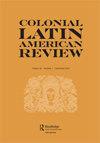Foreword
IF 0.4
2区 历史学
Q1 HISTORY
引用次数: 0
Abstract
From its earliest days, in the 1990s, Colonial Latin American Review sought to publish a wide variety of perspectives. Eschewing prescriptions and proscriptions, Fred Luciani described the journal’s ambition as endeavoring ‘to represent the broadest possible range of scholarship on colonial Latin America.’ Even a quick scan of back issues reveals how seriously the Editorial Board took this charge, cultivating disciplinary, geographic and methodological diversity. At the Taylor & Francis website, it is possible to see the number-of-views per article: while such accounting says precious little about how many people have actually read a CLAR essay from start to finish or mulled its arguments, the numbers show that all the genres of scholarship published in CLAR have their fans. Visual culture, literary practices, and historical projects all have piqued readers’ curiosities. No less importantly, the journal has been unwavering in its commitment to publish the work of scholars just finding their footing along with that written by those who have been walking through the field for decades. This, too, represents a kind of breadth. Nevertheless, as CLAR has participated in—and reshaped—discussions in colonial Latin American studies over the last thirty years, certain themes and geographies have come to the fore. For instance, reading through the backlist I see that the journal has contributed more emphatically to debates about Indigeneity than Blackness; it has developed histories of New Spain and the Andes most often, and it has discussed land and politics more intently than waterways or performance. Gender, too, has been a constant theme. Let me be clear, impressive articles that address Black histories or theatrical works have appeared (and, I hope, will continue to appear) in CLAR. Yet these are arenas where the journal has not yet made its most consistent interventions. This, I suspect, has much to do with approaches to colonialism in Latin America that have held sway through 1990s and early 2000s. The same might well be said of trans-Pacific histories and animal studies, environmental histories and studies of orality and sound—all of which have surfaced in CLAR, but not more frequently than trans-Atlantic histories, human-centered histories or studies of writing, mapping and texts. Every academic journal has its patterns, its editorial leanings, its scholarly predilections. And no journal, no matter how willing to embrace heterogeneity, can address everything. What interests me most, as CLAR enters its 30th year, is what leading interdisciplinary scholarship on colonialism and Latin America could look like. Submissions to the journal are healthy—in number and in seriousness of purpose— yet I see challenges on the nearhorizon that implicate all of us who work at the intersection of the humanities and the social sciences. These include the viability of traditional peer-review and current economic models for open-access publishing. Relatedly and, at least to me, more vexing are the ethics of research based on long-distance travel. Given the climate crisis and increasingly harsh divides amongst scholars with strong financial support and those without, it seems well past time to envision and to create new habits of scholarship. While I am hardly among the first to signal these concerns, I raise them here for two reasons. First, I think it worth building out, and continuing to deliver on CLAR’s initial promise, which was to publish serious and diverse, interdisciplinary scholarship on Latin前言
从20世纪90年代创刊之初,《殖民拉丁美洲评论》就试图发表各种各样的观点。弗雷德·卢西亚尼(Fred Luciani)避开了处方和禁令,他将该杂志的抱负描述为努力“代表关于拉丁美洲殖民地的最广泛的学术研究”。即使快速浏览一下过去的几期杂志,也会发现编辑委员会是多么认真地对待这项任务,培养学科、地域和方法上的多样性。在Taylor & Francis的网站上,可以看到每篇文章的阅读次数:虽然这样的统计几乎没有说明有多少人真正从头到尾阅读了CLAR的文章,或者仔细考虑了它的论点,但这些数字表明,CLAR上发表的所有类型的学术研究都有自己的粉丝。视觉文化、文学实践和历史项目都激起了读者的好奇心。同样重要的是,该杂志一直坚定不移地致力于发表那些刚刚找到立足点的学者的作品,以及那些在这个领域已经走了几十年的人的作品。这也代表了一种广度。然而,在过去的三十年中,CLAR参与并重塑了拉丁美洲殖民地研究的讨论,某些主题和地理位置已经脱颖而出。例如,通过阅读后备名单,我发现该杂志对关于土著的辩论的贡献比黑人更突出;它最常发展新西班牙和安第斯山脉的历史,它更专注于讨论土地和政治,而不是水道或表演。性别也是一个永恒的主题。让我明确一点,关于黑人历史或戏剧作品的令人印象深刻的文章已经出现(我希望,将继续出现)在CLAR上。然而,在这些领域,该杂志尚未做出最一致的干预。我怀疑,这与20世纪90年代和21世纪初在拉丁美洲占据主导地位的殖民主义方法有很大关系。跨太平洋历史、动物研究、环境历史、口述和声音研究也同样如此——所有这些都在CLAR中出现过,但并不比跨大西洋历史、以人类为中心的历史或写作、制图和文本研究更频繁。每一份学术期刊都有自己的模式、编辑倾向和学术偏好。无论期刊多么愿意接受异质性,都无法解决所有问题。在CLAR成立30周年之际,我最感兴趣的是,关于殖民主义和拉丁美洲的领先跨学科学术研究可能会是什么样子。向该杂志提交的论文在数量和目的上都是健康的,但我看到了近期的挑战,这涉及到我们所有在人文科学和社会科学交叉领域工作的人。其中包括传统同行评议的可行性和开放获取出版的当前经济模式。与此相关,至少对我来说,更令人烦恼的是基于长途旅行的研究的伦理问题。考虑到气候危机,以及有雄厚资金支持的学者和没有雄厚资金支持的学者之间日益严重的分歧,设想和创造新的学术习惯似乎早就是过去的事了。虽然我不是第一个提出这些担忧的人,但我在这里提出这些担忧有两个原因。首先,我认为它值得建立,并继续履行CLAR最初的承诺,即发表关于拉丁语的严肃和多样化的跨学科学术研究
本文章由计算机程序翻译,如有差异,请以英文原文为准。
求助全文
约1分钟内获得全文
求助全文
来源期刊

Colonial Latin American Review
HISTORY-
CiteScore
0.60
自引率
25.00%
发文量
25
期刊介绍:
Colonial Latin American Review (CLAR) is a unique interdisciplinary journal devoted to the study of the colonial period in Latin America. The journal was created in 1992, in response to the growing scholarly interest in colonial themes related to the Quincentenary. CLAR offers a critical forum where scholars can exchange ideas, revise traditional areas of inquiry and chart new directions of research. With the conviction that this dialogue will enrich the emerging field of Latin American colonial studies, CLAR offers a variety of scholarly approaches and formats, including articles, debates, review-essays and book reviews.
 求助内容:
求助内容: 应助结果提醒方式:
应助结果提醒方式:


